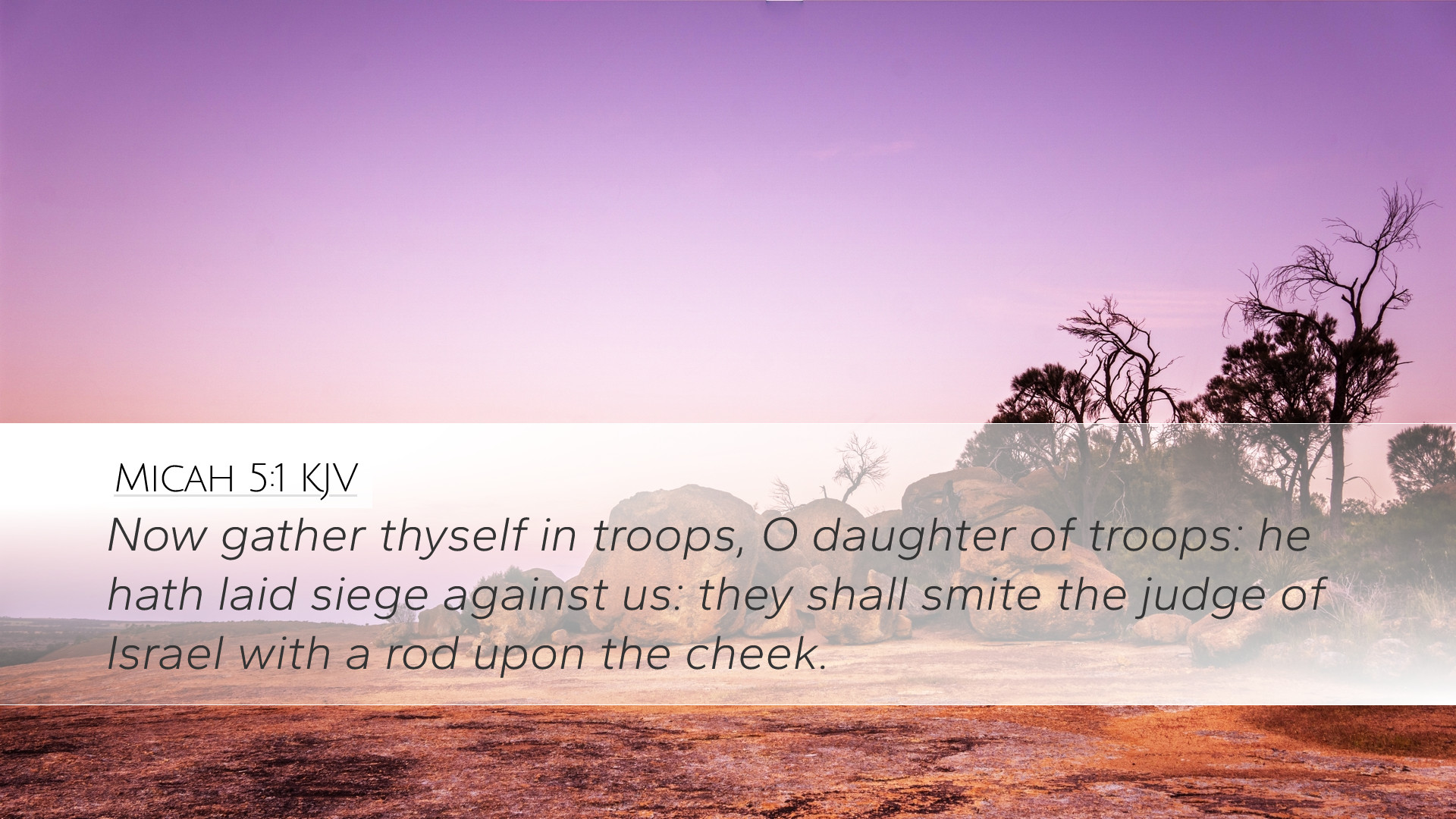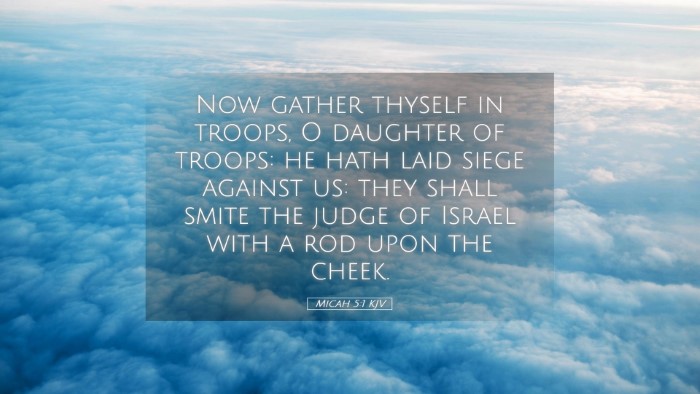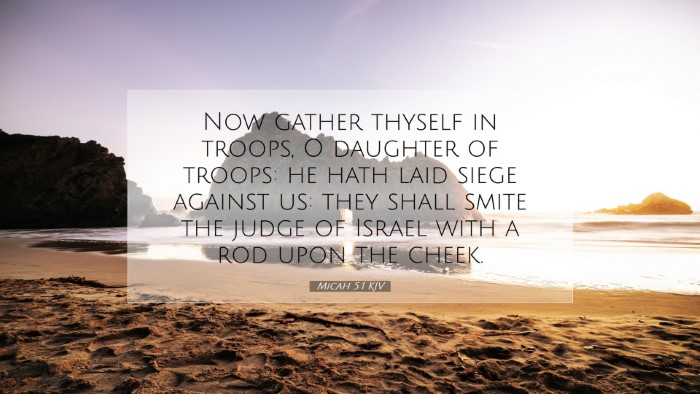Old Testament
Genesis Exodus Leviticus Numbers Deuteronomy Joshua Judges Ruth 1 Samuel 2 Samuel 1 Kings 2 Kings 1 Chronicles 2 Chronicles Ezra Nehemiah Esther Job Psalms Proverbs Ecclesiastes Song of Solomon Isaiah Jeremiah Lamentations Ezekiel Daniel Hosea Joel Amos Obadiah Jonah Micah Nahum Habakkuk Zephaniah Haggai Zechariah MalachiMicah 5:1
Micah 5:1 KJV
Now gather thyself in troops, O daughter of troops: he hath laid siege against us: they shall smite the judge of Israel with a rod upon the cheek.
Micah 5:1 Bible Commentary
Commentary on Micah 5:1
Micah 5:1 states, "Now gather thyself in troops, O daughter of troops: he hath laid siege against us: they shall smite the judge of Israel with a rod upon the cheek." This verse presents a vivid portrayal of distress within Israel, foreshadowing events of judgment and the subsequent emergence of a ruler from Bethlehem. The commentary draws on the insights of various theologians to elucidate its significance.
Contextual Background
The historical backdrop of Micah's prophecy during the eighth century B.C. reflects a turbulent time in Judah's history. This was characterized by national decline, ethical decay, and looming threats from neighboring nations. Micah, as a prophet, speaks to both immediate circumstances and future hope, intertwining themes of judgment and restoration.
Verse Analysis
In this verse, Micah calls the nation to "gather thyself in troops," indicating a gathering in a time of crisis. This gathering may refer to military readiness or a call for solidarity among the people as they face their adversaries. Matthew Henry notes that this term indicates an imminent threat, likely referring to the Assyrian siege. Henry's Interpretation: He emphasizes that the siege is a divine action, allowing the enemies to approach Israel as God’s discipline for their sins. The "daughter of troops" reflects the plight of Jerusalem, metaphorically depicted as a besieged woman.
The Significance of the Siege
Albert Barnes elaborates on the siege noted in the verse, identifying it as a tangible symbol of God's wrath upon Israel. He illustrates the severity of this judgment—suggesting that despite their defenses, the people would face drastic consequences due to their disobedience.
The Ruler from Bethlehem
This verse, while depicting the current distress, sets the stage for the promise of a future ruler. The ruler mentioned in subsequent verses signifies hope and restoration. Adam Clarke points out that this ruler is expected to come from Bethlehem, which further conveys God’s providential plan amid turmoil. Clarke's Observation: Clarke provides a deeper understanding of Bethlehem as "the house of bread," denoting nourishment and sustenance that this ruler would bring to a spiritually famished people.
Interpretation of the "Judge of Israel"
The phrase "judge of Israel" brings profound implications about leadership. It signifies vulnerability and the reality of leadership being subject to trials and humiliation. Henry comments that the rod upon the cheek symbolizes deep humiliation for the king, expressing the defeat of Israel’s authority.
Spiritual Implications
The implications extend beyond historical Israel, capturing a broader theological significance. The concept of God allowing the humiliation of His people is reflective in Christian theology, where suffering and eventual hope are intimately connected. Micah 5:1 sets the tone for understanding Christ's coming as a king who would suffer for His people. Henry notes: "The great King chiefly meant is Christ, who endured such humiliation on behalf of His people."
Application for Today
For contemporary readers, pastors, and theologians, Micah 5:1 serves as a multifaceted lesson. It urges reflection on the nature of God’s discipline and the necessity of recognizing national and personal sin. As the Church faces trials analogous to those in Micah's time, there is foundational encouragement in knowing that even amidst adversity, God's covenant promise of deliverance through Christ remains steadfast.
Hope Amidst Despair
The thematic transition from despair due to siege to hope through the promised ruler is paramount. Barnes highlights that believers, much like the Israelites, can find strength in the reality that their judgment is not the end. Just as Israel looked forward to a ruler bringing peace, Christians today can anticipate the second coming of Christ, who reigns eternally.
Conclusion
Micah 5:1 encapsulates both a cry of distress and a promise of hope. The insights gathered from esteemed theologians like Henry, Barnes, and Clarke collectively illuminate the depths of this single verse. Its implications on leadership, community, sin, and restoration provide a comprehensive understanding that can be applied in various contexts today. In challenging times, the assurance of God's deliverance reminds both leaders and followers of their eternal hope anchored in Christ.


